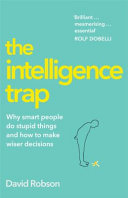

One of the central themes of 'The Intelligence Trap' is the idea that intelligence does not equate to rational thinking. The author, David Robson, argues that highly intelligent individuals can still fall prey to cognitive biases and flawed reasoning. This is largely due to overconfidence in their own abilities, which can lead to mistakes in judgment. Intelligent people may also be more likely to engage in complex reasoning, which can obscure simpler truths. Robson uses various studies and examples to illustrate how intelligence can sometimes lead to a false sense of security, causing individuals to overlook critical information or dismiss alternative viewpoints. The book emphasizes the importance of recognizing the limitations of our intelligence and adopting a more humble approach to knowledge and decision-making.
Continue readingRobson delves into the various cognitive biases that can affect everyone, regardless of their intelligence. He discusses biases such as confirmation bias, where individuals favor information that confirms their pre-existing beliefs, and the Dunning-Kruger effect, where less competent individuals overestimate their abilities. The book highlights how these biases can lead to poor decision-making and can be particularly detrimental in high-stakes environments. Robson provides compelling examples from history, science, and everyday life to demonstrate how cognitive biases can skew our perceptions and lead to irrational choices. By understanding these biases, readers can become more aware of their own thought processes and strive for more rational decision-making.
Continue readingIn contrast to intelligence, Robson introduces the concept of wisdom as a crucial element in effective decision-making. Wisdom encompasses not just knowledge, but also experience, empathy, and the ability to consider the broader context of a situation. The author argues that wisdom can mitigate the negative effects of intelligence traps by encouraging individuals to think critically and reflectively. Robson shares insights from psychology and philosophy on how wisdom can be cultivated, emphasizing the importance of humility, open-mindedness, and a willingness to learn from others. This idea promotes the notion that wisdom is a more reliable predictor of good decision-making than intelligence alone.
Continue readingRobson stresses the value of seeking out diverse perspectives to combat the limitations of individual thinking. He argues that collaboration and dialogue with others can help to challenge our biases and broaden our understanding of complex issues. The book presents evidence that groups with diverse viewpoints tend to make better decisions than homogenous ones, as they are more likely to consider a wider range of information and solutions. This idea encourages readers to engage with people from different backgrounds and disciplines, fostering a culture of inclusivity and openness that can enhance collective intelligence.
Continue readingRobson discusses the shortcomings of traditional education systems, which often prioritize rote memorization over critical thinking skills. He advocates for educational approaches that encourage inquiry, skepticism, and the ability to analyze information critically. The book highlights the importance of teaching students how to think rather than what to think, equipping them with tools to navigate a complex world filled with misinformation. By fostering critical thinking in education, individuals can become better equipped to make informed decisions and avoid the pitfalls of the intelligence trap.
Continue readingThroughout 'The Intelligence Trap,' Robson offers practical strategies for improving decision-making processes. He emphasizes the importance of slowing down and reflecting before making choices, particularly in high-pressure situations. Techniques such as considering the opposite perspective, seeking feedback from others, and breaking down complex problems into manageable parts can help individuals avoid cognitive traps. The book provides actionable advice that readers can implement in their daily lives, promoting a more thoughtful and deliberate approach to decision-making.
Continue readingIn the concluding sections of the book, Robson explores the implications of his findings for society as a whole. He discusses the challenges posed by rapid technological advancements and the potential for increased misinformation in the digital age. The author argues that as we navigate an increasingly complex world, the ability to think wisely and critically will be paramount. He calls for a societal shift towards valuing wisdom and collaboration over mere intelligence, suggesting that this could lead to more effective solutions for global challenges. This idea resonates with the need for a collective effort to foster a culture that prioritizes thoughtful decision-making.
Continue readingThe reading time for The Intelligence Trap depends on the reader's pace. However, this concise book summary covers the 7 key ideas from The Intelligence Trap, allowing you to quickly understand the main concepts, insights, and practical applications in around 21 min.
The Intelligence Trap is definitely worth reading. The book covers essential topics including The Fallibility of Intelligence, Cognitive Biases and Their Impact, The Role of Wisdom in Decision-Making, providing practical insights and actionable advice. Whether you read the full book or our concise summary, The Intelligence Trap delivers valuable knowledge that can help you improve your understanding and apply these concepts in your personal or professional life.
The Intelligence Trap was written by David Robson.
If you enjoyed The Intelligence Trap by David Robson and want to explore similar topics or deepen your understanding, we highly recommend these related book summaries:
These books cover related themes, complementary concepts, and will help you build upon the knowledge gained from The Intelligence Trap. Each of these summaries provides concise insights that can further enhance your understanding and practical application of the ideas presented in The Intelligence Trap.